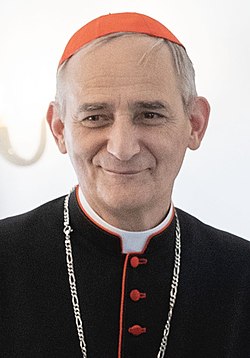Background and Experience
Born on October 11, 1955, in Rome, Italy, Matteo Zuppi was ordained a priest in 1981. His early ministry was deeply connected to the Community of Sant'Egidio, a Catholic lay association dedicated to social service, ecumenism, and peace-building. Through this association, Zuppi played a significant role in peace negotiations in Mozambique in the early 1990s, helping to end a 16-year civil war.
In 2012, Pope Benedict XVI appointed him as an auxiliary bishop of Rome. Pope Francis later named him Archbishop of Bologna in 2015 and created him a cardinal in 2019. In 2022, he was elected president of the Italian Episcopal Conference (CEI), making him the leader of the Italian bishops and a key figure in the Church's engagement with Italian society and politics.
Throughout his ecclesiastical career, Zuppi has maintained his focus on serving the poor and marginalized. In Bologna, he is known for his simple lifestyle, often seen riding his bicycle around the city and engaging directly with people from all walks of life. His approach to ministry closely mirrors Pope Francis's emphasis on a "Church of the poor, for the poor."
"The Church must be a place of welcome for everyone, especially those who feel excluded or judged. Our mission is not to condemn but to accompany people on their journey toward God."
— Cardinal Matteo Zuppi
Key Agenda Items
Peace and Conflict Resolution
Drawing on his experience with the Community of Sant'Egidio and his role in the Mozambique peace process, Cardinal Zuppi has made peace-building a central focus of his ministry. He has been vocal about the need for dialogue and negotiation in resolving conflicts, including the war in Ukraine.
If elected Pope, Zuppi would likely elevate the Vatican's role in international peace processes, potentially establishing new diplomatic initiatives focused on conflict zones and strengthening the Church's capacity for mediation and reconciliation.
Migration and Refugee Support
As the leader of the Italian bishops during a period of significant migration across the Mediterranean, Zuppi has been a strong advocate for humane migration policies and robust support systems for refugees and asylum seekers. He has criticized nationalist and xenophobic rhetoric and has called for greater solidarity with displaced persons.
His agenda includes expanding the Church's humanitarian response to migration crises, advocating for more just immigration policies at the international level, and promoting integration programs within Catholic communities.
Ecumenism and Interfaith Dialogue
Through his work with the Community of Sant'Egidio, Zuppi has been deeply involved in ecumenical and interfaith initiatives. He has participated in numerous interreligious prayer gatherings and has emphasized the importance of building relationships across religious boundaries.
If elected, he would likely continue and expand Pope Francis's efforts to strengthen relationships with other Christian denominations and non-Christian religious communities, with a particular focus on practical cooperation on issues of shared concern such as peace, poverty, and environmental protection.
Church Reform and Synodality
Cardinal Zuppi has been a strong supporter of Pope Francis's emphasis on synodality and his efforts to reform Church governance. As president of the Italian Episcopal Conference, he has worked to implement a more collaborative and consultative approach to decision-making.
His reform agenda includes continuing the decentralization of Church authority, strengthening the role of lay people (especially women) in Church leadership, and creating more transparent and accountable governance structures at all levels of the Church.
Urban Ministry and Social Outreach
Drawing on his experience in Rome and Bologna, Zuppi has developed a particular focus on urban ministry and outreach to marginalized communities in cities. He has emphasized the need for the Church to be present in urban peripheries and to address issues such as homelessness, addiction, and social isolation.
His agenda includes developing new models of urban ministry, strengthening Catholic social service organizations, and encouraging parishes to become more actively engaged with social issues in their communities.
